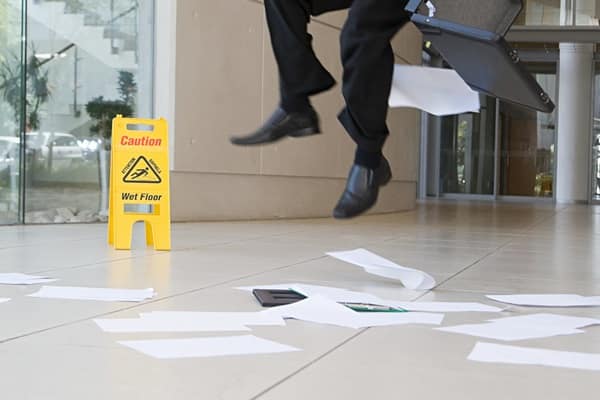London’s startup ecosystem has become a major driver of economic growth, fostering innovation across various industries. With an increasing number of entrepreneurs launching businesses, the city has become a hotspot for cutting-edge ideas and collaborative work environments. However, amid the excitement of rapid expansion, workplace safety often takes a backseat. Many startups operate in non-traditional office spaces or high-pressure settings, exposing employees to greater risks of injury.
Personal injury claims are rising in this fast-paced sector, as startups frequently lack the structured safety measures found in larger corporations. Beyond immediate injuries, some employees may face long-term health challenges that prevent them from returning to work, making them eligible for Social Security Disability (SSD) benefits. Understanding how personal injury risks, workplace safety, and SSD benefits intersect is essential for startups aiming to protect both their workforce and their long-term viability.
The rise of startups and the increasing risk of workplace injuries
London’s startup culture is defined by flexibility, innovation, and collaboration. Many startups operate in co-working spaces, converted warehouses, or hybrid environments where employees share resources and workstations. While this model fosters creativity, it can also create safety hazards. According to one law firm, poorly maintained office equipment, cluttered walkways, and ergonomic issues contribute to an increased risk of workplace injuries such as slips, falls, and repetitive strain injuries.
The fast-paced nature of startups often prioritizes growth and efficiency over workplace safety. Employees may work long hours in makeshift office setups or participate in physically demanding tasks without proper training or equipment. Without established safety protocols, startups may find themselves dealing with frequent personal injury claims that could have been avoided with better planning. Recognizing these risks and implementing preventive measures is key to ensuring employee well-being while maintaining productivity.
Why personal injury claims and SSD applications are rising in the startup sector
Startups often operate on tight budgets, making it difficult to invest in comprehensive safety programs. Many lack designated health and safety officers, and some may not even have formal policies in place to address workplace hazards. According to www.injuryattorneyelite.com, this lack of structure increases the likelihood of workplace injuries, leading to a rise in personal injury claims. Employees who suffer from serious injuries may find themselves unable to work, leaving them in financial distress.
In cases where an injury leads to long-term disability, employees may qualify for SSD benefits. These benefits provide financial assistance to individuals who can no longer perform their job duties due to physical or mental impairments. However, obtaining SSD approval can be a complex process, requiring medical documentation and proof that the injury prevents gainful employment. Startups must be aware of their role in ensuring that injured employees receive the necessary support, whether through workers’ compensation, employer-provided disability insurance, or guidance in applying for SSD benefits.
Navigating the legal landscape: Personal injury claims and SSD eligibility
Startups may assume that their small size or informal operations exempt them from strict workplace regulations, but this is not the case. The Health and Safety at Work Act 1974 mandates that all businesses, regardless of size, must provide a safe work environment. Failure to comply with these regulations can result in costly lawsuits, government penalties, and reputational damage. Employers must take proactive steps to prevent workplace injuries, including regular safety assessments and employee training.
For employees who sustain injuries that leave them permanently or temporarily disabled, SSD benefits can serve as a financial lifeline. However, not all workplace injuries automatically qualify for SSD, as the Social Security Administration (SSA) has strict criteria for eligibility. To receive benefits, an individual must prove that their condition significantly limits their ability to work and is expected to last for at least 12 months. Startups must understand these regulations to better assist employees in navigating both personal injury claims and the SSD application process.
Implementing workplace safety and disability support in the startup culture
Integrating workplace safety into a startup’s culture does not have to come at the expense of innovation. Simple measures such as ergonomic workstations, clear walkways, and proper lighting can significantly reduce the risk of injury. Startups should also provide safety training tailored to their specific work environment, whether it involves office-based tasks, remote work, or hands-on technical projects. Investing in preventive measures can help businesses avoid costly legal disputes while improving employee satisfaction and productivity.
Beyond physical safety, startups must address the mental and emotional well-being of their workforce. The high-pressure nature of startups can lead to burnout, anxiety, and stress-related conditions, some of which may qualify for SSD benefits if they become severe enough to impair work performance. Employers should create a supportive work environment by offering flexible schedules, mental health resources, and policies that promote work-life balance. Taking these steps not only reduces the risk of workplace injuries but also fosters a healthier, more engaged workforce.
How startups can protect themselves and their employees
Proactive risk management is essential for startups looking to minimize personal injury claims and provide adequate support for injured employees. Developing a clear safety policy, conducting routine risk assessments, and ensuring compliance with workplace safety regulations can significantly reduce liability. Startups should also educate employees on workplace safety procedures and encourage open communication about potential hazards.
In addition to preventive measures, startups must invest in insurance policies that cover workplace injuries and disability-related claims. Workers’ compensation insurance can help cover medical expenses and lost wages for injured employees, while employer-provided disability insurance can serve as a safety net for those unable to return to work. By taking these precautions, startups can mitigate financial risks, protect their workforce, and foster a culture of safety and responsibility.
Conclusion
London’s startup scene is a dynamic and fast-growing industry, but workplace safety should not be an afterthought. The flexibility and innovation that define startups can also introduce significant risks, leading to workplace injuries and rising personal injury claims. Employers must recognize their legal responsibilities and implement effective safety measures to protect their employees from harm.
Furthermore, startups should be prepared to support employees who experience long-term injuries by understanding SSD benefits and workplace disability protections. By prioritizing safety, compliance, and employee well-being, startups can create a more sustainable work environment that balances innovation with responsibility. As the industry continues to evolve, businesses that commit to both growth and worker protection will set the standard for long-term success.
Get real time update about this post category directly on your device, subscribe now.






Leave a Comment